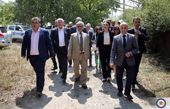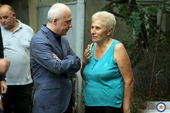
Installation of wire fences in village Gugutiantkari resumes, diplomatic corps arrive at scene
By Nika Gamtsemlidze
Monday, August 19
After the war of 2008, Georgian and Russian authorities signed a six-point ceasefire agreement. As the agreement mandates, Russian armed forces should have been “pulled back on the line, preceding the start of hostilities.” After 11 years since the war, occupation forces continue the process of so-called borderisation. As many have said, “for some, the war ended in 2008, but for those living near the borders, it is still an ongoing process.”
A few days ago, occupation forces once again started installing wire fences in the Gugutiantkari village of Gori municipality. Despite the huge international outcry, the forces were able to cut through the land of two families living in the village, making it impossible for them to access their own properties.
Public officials and international corps accredited in Georgia issued special statements. Several Ambassadors and representatives of more than 20 embassies visited the so-called border.
As the British Ambassador to Georgia, H.E. Justin McKenzie Smith wrote on his personal Twitter page, the wire fences “serve no purpose except to cause hardship to families and divide local communities.”
The Ambassador of Japan to Georgia, H.E. Tadaharu Uehara was one of those visiting the dividing line. As he said with the journalists, “Japan opposes the change of Georgia’s internationally recognized borders.”
He also talked about the humanitarian situation in the occupied territories and noted that family division represents a huge problem for people. First Secretary of the Embassy of Ukraine, Petro Bogdan, also expressed his support towards sovereignty and integrity of Georgia, while Carlo Natale, the deputy head of the European Union in Georgia said that “the EU is very concerned about these activities.”
The Embassy of the United States in Georgia issued a special statement saying that “The process of “borderisation” is a threat to peace and stability, as it harms livelihoods and hinders the flow of people and goods.”
“We once again call upon Russia to withdraw its forces to pre-conflict positions and allow unfettered access for the delivery of humanitarian assistance, per its obligations under the 2008 ceasefire agreement,” reads the statement of US Embassy.
As the Charge d'Affaires of the United States, Elisabeth Rood noted, this situation “harms security in the region.”
“The US and Georgia’s international partners, including those who participate in the Geneva international discussions, are very deeply engaged with the government of Georgia on a daily basis to respond to all of the challenges presented by Russia’s occupation of the Georgian territories, including the current problem we are facing in the village of Gugutiantkari,” noted the US Charge d'Affaires.
According to Chris Davenport, Information Officer of the US Embassy, the United States will always support the territorial integrity of Georgia. “I am proud to stand beside the people of Gugutiantkari to say that the United States will never accept the Russian occupation of Georgia’s sovereign territory,” reads the statement of Davenport.
The Minister of Foreign Affairs of Georgia, Davit Zalkaliani also arrived in Gugutiantkari. Minister met with the locals and talked about their problems. According to him, he arrived at the scene under the instruction of the Prime Minister.
“I provided them with comprehensive information on the actions taken by the Ministry of Foreign Affairs. Their request was to prevent escalation of the situation. I promised them that we would continue to inform the international community in the future too,” told Zalkaliani to the reporters about his meeting with the locals.
As the Prime Minister of Georgia, Mamuka Bakhtadze said, “the most important thing is to help those who live in Gugutiantkari.”
“Diplomatic corps arrived at the place and sadly, everyone once again saw how Russia is continuing the occupation of Georgia. Sadly, the process of so-called borderisation is still underway. Today, the most important thing is to help those who live near these territories,” noted PM.
The State Minister for Reconciliation and Civic Equality of Georgia, Ketevan Tsikhelashvili also arrived at the site and said that the government will strengthen the help of the people living near the so-called borders.
While Russian officials look at this process cynically and say that the process of so-called borderisation is a “myth,” it is very real for hundreds of Georgians, whose villages are being divided in the middle of the country.
The ongoing “creeping occupation” has left people without homes, and even managed to swallow numerous villages like Ditsi, Dvani, and Adzvi. The process started after the Russia-Georgian War, which was fought between Georgia, Russia and the Russian-backed self-proclaimed republics of so-called South Ossetia and Abkhazia. The war took place in August of 2008 following a period of worsening relations between the two countries.



